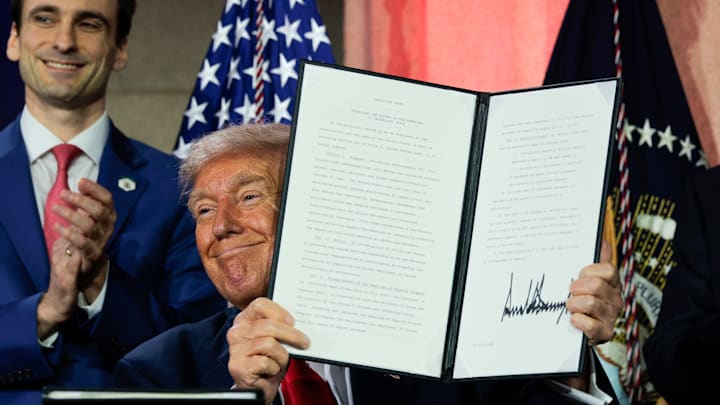Trump targets pay-to-play: Protects women’s sports, champions NIL in explosive executive order
In a headline-grabbing move that’s already shaking college sports to its core, former President Donald Trump signed a sweeping executive order Thursday aimed at cracking down on “pay-to-play” schemes while simultaneously reaffirming support for Name, Image, and Likeness (NIL) rights—and mandating the protection of women’s and non-revenue sports.
The order comes just weeks after the landmark House v. NCAA settlement, which allowed universities to begin directly compensating athletes. With bidding wars erupting for elite football and men’s basketball players, alarm bells rang across Title IX circles: would women’s sports get pushed aside?
Trump’s order attempts to put a stop to that.
“No athlete shall receive direct or indirect compensation from third-party collectives as a condition of enrollment,” the order reads. “Universities must implement any athlete compensation model in a way that protects and expands scholarship and competition opportunities for women and non-revenue sports.”
In short: NIL stays. Collectives don’t. And Title IX isn’t taking a back seat.

While many critics feared Trump might roll back athlete freedoms, the order preserves their right to earn from personal brands—just not through booster pay-to-play deals. The directive also signals potential Department of Education enforcement for programs that fail to maintain balance across gender and sport.
This could create chaos or clarity depending on where you stand. Schools are now on notice: open bidding wars might be dead, but a restructured system is here to stay.
The impact on schools like Kentucky, where football and men’s basketball dominate spending, could be profound. Will schools redirect funds to keep women’s soccer or men’s golf afloat? Or will athletic departments find creative workarounds?
Regardless, the executive order throws a wrench into the fast-forming NIL ecosystem and puts institutional accountability back in the spotlight.
The Trump move might be political. It’s definitely disruptive. But for women’s sports and the soul of college athletics, it could be the boldest pivot since NIL was legalized.
